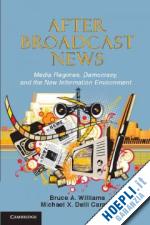Bruce A. Williams teaches in the Department of Media Studies at the University of Virginia. He received his Ph.D. in political science from the University of Minnesota and has taught at the Pennsylvania State University, the University of Michigan, the University of Illinois and the London School of Economics. He has published four books and more than forty scholarly journal articles and book chapters. His book Democracy, Dialogue, and Environmental Disputes: The Contested Languages of Social Regulation (with Albert Matheny) won the Caldwell Prize as best book for 1996 from the Science, Technology, and Environmental Politics section of the American Political Science Association. His textbook, The Play of Power: An Introduction to American Politics (with James Eisenstein, Mark Kessler and Jacqueline Switzer), was selected by the Women's Caucus of the American Political Science Association in 1997 as the political science text that best deals with women's issues and diversity. His most recent book is The New Media Environment: An Introduction (with Andrea L. Press). Also with Andrea Press, he is the editor of The Communication Review. Over the last five years, he has been active in a number of initiatives in the area of media policy and ethics.
Michael X. Delli Carpini, Dean of the Annenberg School for Communication, received his B.A. and M.A. from the University of Pennsylvania (1975) and his Ph.D. from the University of Minnesota (1980). Prior to joining the University of Pennsylvania faculty in July 2003, Professor Delli Carpini was Director of the Public Policy program of the Pew Charitable Trusts (1999–2003) and a member of the Political Science Department at Barnard College and the graduate faculty of Columbia University (1987–2002), serving as chair of the Barnard department from 1995 to 1999. Delli Carpini began his academic career as an Assistant Professor in the Political Science Department at Rutgers University (1980–7). His research explores the role of the citizen in American politics, with particular emphasis on the impact of the mass media on public opinion, political knowledge and political participation. He is author of Stability and Change in American Politics: The Coming of Age of the Generation of the 1960s; What Americans Know about Politics and Why It Matters (winner of the 2008 American Association of Public Opinion Researchers Book Award); A New Engagement? Political Participation, Civic Life and the Changing American Citizen; and Talking Together: Public Deliberation and Political Participation in America. He has also authored or edited numerous articles, essays and edited volumes on political communications, public opinion and political socialization. Professor Delli Carpini was awarded the 2008 Murray Edelman Distinguished Career Award from the Political Communication Division of the American Political Science Association.











